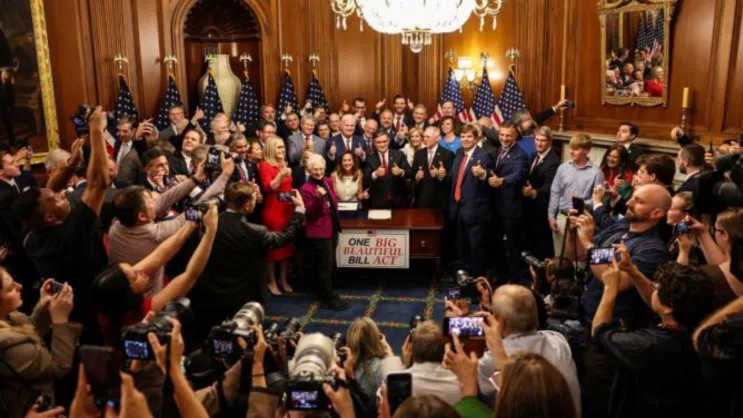Republican lawmakers have passed a major bill and sent it to President Donald Trump just before Independence Day. As planned, Trump will sign the legislation during a July 4 ceremony. He has described it as his “big beautiful” bill.
Bill Clears Congress by Narrow Margin
First, the Senate approved the bill with a tie-breaking vote from Vice President JD Vance. Earlier in May, the House had passed a version of the bill by just one vote. Finally, the House approved the final draft on Thursday with a 218–214 vote.
Key Features of the Bill
$4.5 Trillion in Tax Cuts
The bill contains about $4.5 trillion in tax reductions. Specifically, it raises the child tax credit from $2,000 to $2,200. However, many low-income families will not receive the full amount.
In addition, it introduces temporary deductions for tips, overtime, and auto loans. older people earning less than $75,000 per year can claim a $6,000 deduction. This measure aligns with Trump’s promise to end taxes on Social Security benefits.
Rollback of Clean Energy Incentives
Meanwhile, the bill rolls back several clean energy programs introduced under the 2022 Inflation Reduction Act.
As a result, buyers will no longer receive tax credits for electric vehicles, home charging stations, or energy-efficient home improvements.
Moreover, the legislation shuts down the Greenhouse Gas Reduction Fund. This program had helped nonprofits fund projects that reduce local pollution and carbon emissions.
Funding for Border Security and the Military
In terms of national security, the bill allocates roughly $350 billion to immigration enforcement and defense.
It funds 100,000 immigration detention beds and adds 10,000 ICE officers, each receiving a $10,000 signing bonus. Additionally, it increases Border Patrol staffing and introduces higher fees for immigrants applying for asylum or legal status.
Furthermore, the bill gives billions to the Pentagon. It includes $25 billion for the “Golden Dome” missile defense system and $1 billion for defense operations related to the border.
Changes to Medicaid and Health Coverage
At the last moment, lawmakers added a provision that gives $10 billion annually to rural hospitals for five years—totaling $50 billion.
On the other hand, the bill introduces steep Medicaid cuts. It gradually lowers the allowable provider tax from 6% to 3.5% by 2032.
Additionally, it blocks Medicaid payments for one year to family planning providers that offer abortion services, such as Planned Parenthood.
The bill also enforces work requirements for able-bodied adults and mandates more frequent eligibility checks. According to the Congressional Budget Office, these changes could result in 11.8 million Americans losing Medicaid coverage over the next decade.






















